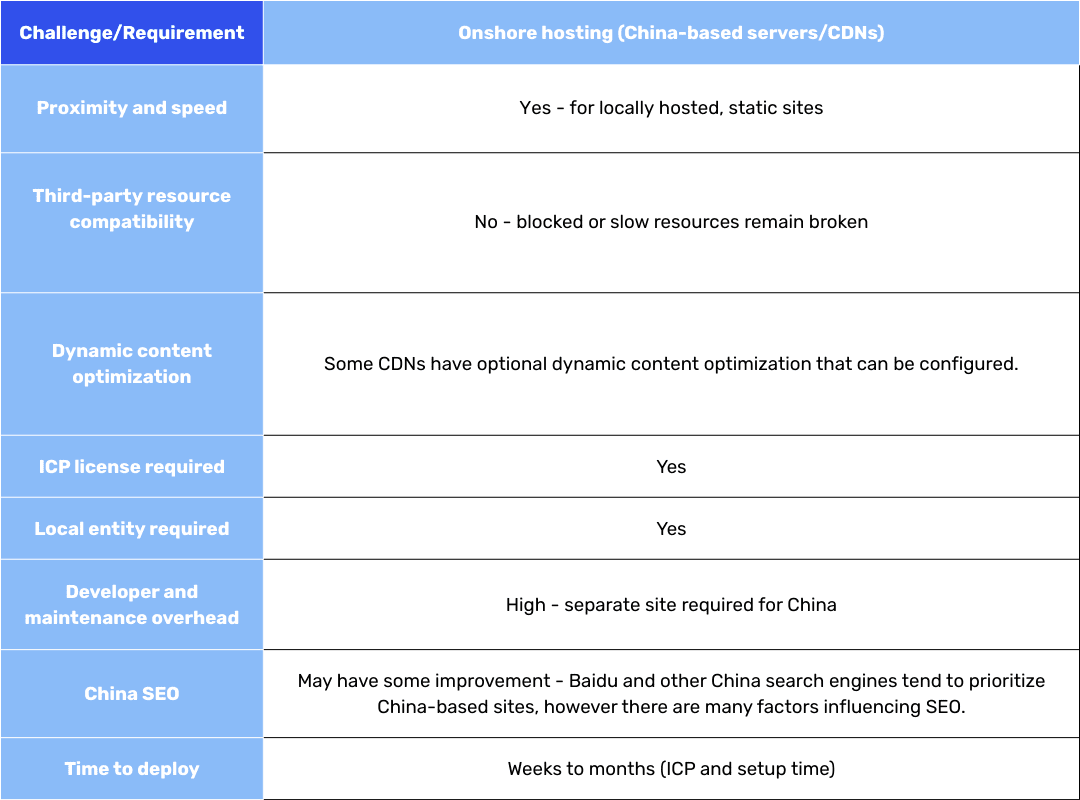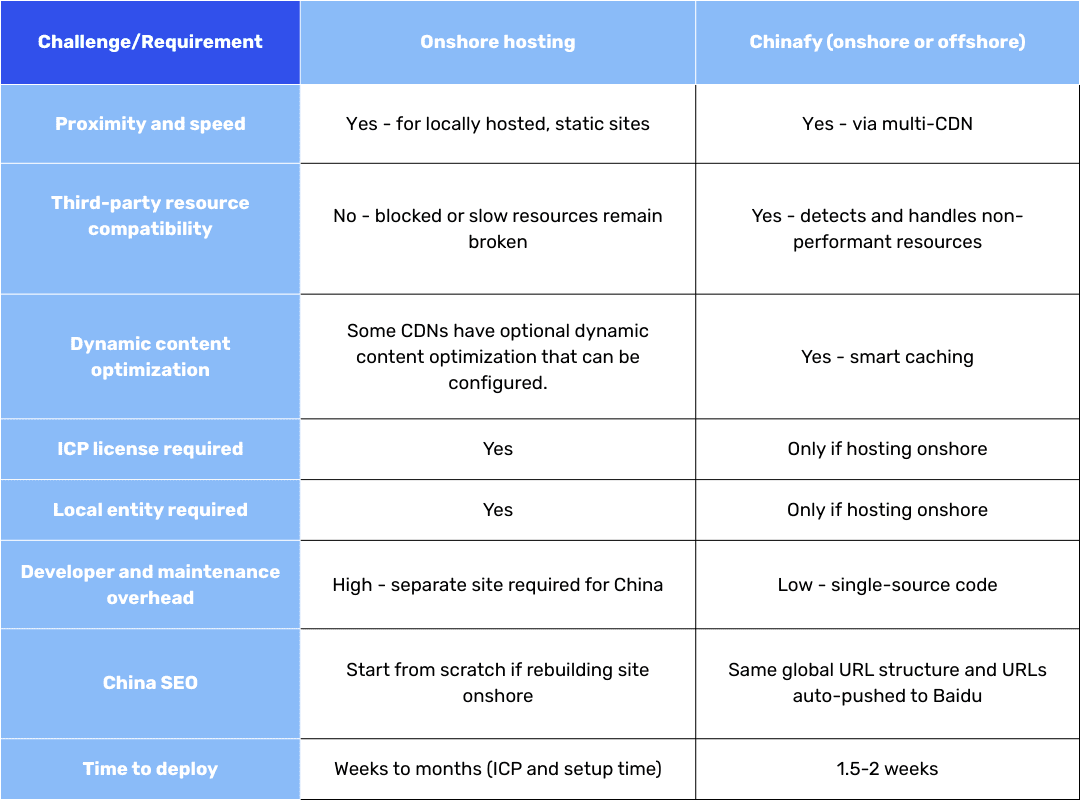1 - Expected post-Chinafy results
Onshore hosting in China: why your website still loads slowly
It’s a common assumption: host your website in China, and any performance issues you’re facing are solved. And although moving your site onshore can reduce latency, many companies find their sites still load slowly or incompletely for users in China.
So why doesn’t onshore hosting in China always equal optimization?
TL;DR: Hosting your website in mainland China can reduce latency compared to hosting outside of China, but it doesn't guarantee speed or functionality. Issues, including third-party resource incompatibility and dynamic content bottlenecks, mean even onshore-hosted sites perform poorly. A full China strategy requires optimization on top of servers and infrastructure. Chinafy helps global websites load fast and fully in China, whether they’re hosted onshore or offshore.
Performance and compliance are not the same thing
When it comes to making your website work in China, two factors are often confused:
Performance: How fast, fully, and reliably your website loads for visitors in China.
Compliance: Whether your website meets the necessary legal and regulatory requirements to operate in China, such as obtaining an ICP license.
If you’re hosting your website onshore in China, certain prerequisites are required for compliance, including:
An ICP filing or license - a certificate displayed on your website, mandatory to legally host your site inside of China.
A legal entity in China or partnership with one - you cannot obtain an ICP license without a registered business in China.
Compliance with content regulations - China has laws around content compliance, such as avoiding politically sensitive or illegal material.
PSB filing if applicable - for some websites, a Public Security Bureau (PSB) filing may be required to comply with cybersecurity and data security regulations.
Read more about PSB Filing in China
Achieving compliance doesn’t guarantee strong web performance in China.
A website with an ICP license may still load slowly or incompletely without the right optimization.
Equally, a website hosted offshore can often perform just as well as an onshore-hosted website with the right optimization solution (more on this below).
What’s required for compliance will depend on your business model, industry, and operational goals. Regardless of your choice, ensuring your website works fast, fully, and reliably in China is essential – so why isn’t onshore hosting the solution?
Onshore hosting only solves for proximity, not compatibility
Hosting your website in China can help reduce latency because the server is geographically closer to the end users. However, most international websites load poorly or break in China, not just because of server distance.
Websites often rely on third-party resources like Google Fonts, Google APIs, YouTube or Vimeo embeds, HubSpot forms, Salesforce integrations, and hundreds more examples that continually evolve. Unfortunately, many of these are either blocked or severely throttled in China, meaning page loading gets delayed, key features might break, or the page could fail to load entirely.
Proximity, without compatibility, is like building a superhighway to a roadblock.
Regardless of where your site is hosted, these resources may load extremely slowly or fail completely.
Even local CDN (content delivery network) services like China Telecom, Alibaba Cloud and Tencent Cloud, which help to accelerate content delivery, don’t solve for slow or broken third-party resources.
Onshore hosting can impact global consistency
Onshore hosting in China also comes with additional infrastructure, responsibilities and costs that sometimes deter global businesses.
Many international companies want:
A single global codebase
Centralized management
Consistent brand experience globally
China-hosted environments often require:
A separate China-specific site
Additional dev & maintenance overhead
Fragmented infrastructure
What onshore solutions do and don’t solve
Let’s summarize what onshore hosting does solve for your website performance in China, and where its limitations are.

Limitations of onshore hosting
So what does “optimization” look like?
Optimization with or without onshore hosting
Chinafy solves performance and compatibility challenges whether you’re hosting onshore or offshore. Here’s how Chinafy works:
Generates a version of your website for China visitors without affecting your current site.
Detects and handles blocked or slow-performant resources (e.g., replacing Google Maps for Baidu Maps for the Chinafy version).
Adds a China-friendly CDN without changing your hosting location.
If you’re hosting offshore, Chinafy routes China-IP-based traffic to the China-optimized version of your site without impacting global traffic which will still go to your existing site. If you’re already hosting onshore, all your traffic will see the optimized version.
Chinafy then keeps your China-optimized site synced with your global one, so any changes are reflected accordingly.
You also don’t have to change your current tech stack. Chinafy works with your existing CMS, CDN, and hosting as long as the website or platform is not officially blocked.

Chinafy vs. hosting onshore without optimization
Hosting your site in China may seem like the only step toward faster performance but it’s not the full solution. Without compatibility optimization, even onshore sites can suffer from long load times and broken user experiences.
Just because your site is in China, doesn’t mean it’s ready for China.
Get in touch with Chinafy today to run a free analysis of your site to explore what’s best for your website.



1 - Expected post-Chinafy results






























